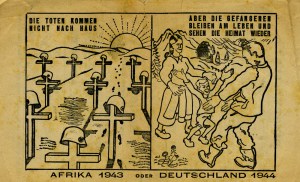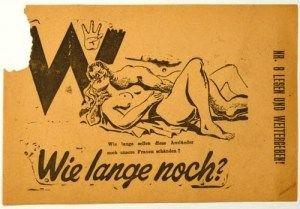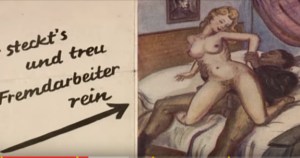Erotic "publicity" in the World War II
The saying says that, in war and in love, everything counts. Never better said in matters of advertising, and even more so, during the infamous days of the Second World War. In this article we will focus on British efforts.
Because of course, dirty advertising was done by everyone. Wars are desperate times, bringing out the worst, and the best, of the human being. But the PWE (Political Warfare Executive, the Office of Political Warfare), was quite witty, and that is surprising.
PWE emerged from an arm of the SOE (Special Operations Executive, Office of Special Operations), which was especially responsible for sabotage and intelligence operations in the countries invaded by Germany. Soon, however, he became independent.
In the summer of 1941, the new advertisement office acquired its own facilities and equipment, staffed by personnel from the Ministry of Information, SOE itself and public radio, the BBC. Their existence remained strictly confidential.

In case I had to interact with the real world, It was used like Department of Political Intelligence's (PID) letterhead.
The radio
In total, the PWE established three radio stations to broadcast advertising. The first and main one was Gustav Siegfried Eins (GS1).
GS1's idea came from Sefton Delmer, a British citizen born and raised in Berlin who had worked for the BBC. The aim of the programs was to undermine the morale of German soldiers by telling them true and false stories about their corrupt leaders.
The role of announcer fell on Peter Seckelmann, a refugee from Berlin. Seckelmann posed as Der Chef, a supposedly fanatical Nazi fanatic who believed that Nazi leadership was not hard enough.
To give him a veil of authenticity, Der Chef broadcast real news about Germany from newspapers and spies. It also gave news about the war, how bad it was going, and that the government wasn't telling people the truth.
But no doubt the most juicy diatribes were focused on the sexual practices of some Nazi leaders. Not so much from the upper echelons, but from middle management, who were less careful with their image.
The "erotic" advertising
According to documents recently made public by the British government, the PWE operators had no shame at all. Not just with the Germans. Churchill was called a "Jewish drunkard," and less publishable things; King George was "the fool on the throne. It had to be disguised.
From one Willi Bückmann, Der Chef complained of being a "homosexual pervert" who liked to dress as a woman.Lieutenant Tienemann likes to flagellate himself. Captain Schmidt was organizing orgies.
A frequent target of Chef reports was Christian Weber, leader of the Nazi party in Bavaria. Weber also organized orgies, to which he invited prominent members of the SS. At these parties, Weber "raffled" women using a roulette wheel.

Another usual target was Robert Ley, head of the Nazi Labour Front. According to PWE, Ley was a whoremonger and drunk, who received extra rations. In this case, the advertisement reached so much that the German media repeated the news, and Ley had to deny everything in public. I wasn't lying.
However, the erotic reports had only one function, to attract the audience. Once captured, she was instilled with other types of news, as usual, false or true.
Printed advertising
Like all GMS contenders, the British dropped propagandistic leaflets in German cities. However, PWE flyers were not very common.
Focusing also on the sexual life of Nazi leaders, the leaflets carried political messages, accompanied by sexual images. The Law case was supported by these leaflets.

In a case well known to German soldiers, the PWE dropped a flyer illustrating what their wives were allegedly doing with foreign workers.
A project that did stop in time was a photo of the Fuhrer, holding his penis with his hand. A cartoonist from PWE produced a prototype, but even Delmer thought it was too much. It's so grotesque, I'd rather not publish it.
Not everyone agrees
The advertising of the PWE was not well received by the whole British government. One minister went so far as to say that he would rather lose the war than use these "so un-British" tactics. But the advertising continued. If anything, even the program expanded.
Two new radio stations were opened in 1942, Soldatensender Calais (Transmitter for Calais Soldiers) and Kurzwellesender Atlantik (Atlantic Short Wave Transmitter). The first for German soldiers in France and Belgium, and the second for U-Boot crews.
In both, it was common for Jazz to be broadcast, very popular among young people, but banned by the Nazi regime as "decadent". High-powered transmitters were used to force the signal to reach its destination, and the audience believed that its source was in Germany.
The PWE broadcasts were so authentic that the Americans believed them. When President Roosevelt learned of the true source, he had a fit of laughter.
Did the "dirty" advertising work?
As far as intelligence officers could investigate after the war, the effect of PWE was little. Few citizens dared to listen to it for fear of Gestapo. Those soldiers who did, they didn't talk about it, for the same reason.
Only the flyer of foreign workers had the desired effect. Many soldiers wrote to their wives warning them not to approach them. Others called on their bosses to pass on the message to the government.
The regime did do something about it, forbidding fraternization. Of course, those who wanted to take the chance did.
After the war, 10 Downing Street ordered the closure of the PWE, and the destruction of all dirty advertising. Something remained, for our delight.